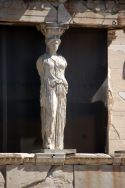August 1, 2011
Greece is the word
We’re back in Greece again, having wandered in and out of Turkey—where we’ll wander back again and here’s some impressions:
Athens looks less like the capital of an empire (which it wasn’t) than the spiritual and cultural leader of the Western world, a position it owes as much to the Romans, who adopted the architecture and the gods (whom they renamed—Zeus became Jupiter, for example) and the Byzantines, who were the curators of classical wisdom and channeled it back to the west in 
 time for the Renaissance—as to the political power of Greece.
time for the Renaissance—as to the political power of Greece.
Athens did save Europe from one Asian Scourge (the Persian Empire, but that was in the 5th century B.C.) as the leader of a Greek confederation, and Greek city-states left ruins of settlement throughout the region, but the highlights of the city—the Parthenon and the Acropolis—date from the end of the Persian wars. The grateful citizens of the other cities gave Athens protection money, and Athenians spent it on the fortress (Acropolis) housing temples that celebrated the city’s patron, Athena, in what is now a world heritage site looming above the city. It helps to imagine what it might have been like that I’ve been to the British Museum, which houses the “Elgin marbles” that once graced the temple of Athena—Lord Elgin took the temple decorations home, but was forced to sell them to the British Museum (which can fend off Greek requests for their return by claiming to have “purchased” the marbles, not stolen them).
As I said, the Romans took the architecture and expanded on it, both in Athens and elsewhere. In  the city, there’s a Temple of Zeus, built by Emperor Hadrian, who had a soft spot for the Greeks, who had reciprocated, building a triumphal arch for the Emperor’s visit to dedicate the Temple. Alexander the Great, a Macedonian barely mentioned in Greece, helped popularize Hellenistic Civilization as far as India, but it was the Roman legions who made it the European standard.
the city, there’s a Temple of Zeus, built by Emperor Hadrian, who had a soft spot for the Greeks, who had reciprocated, building a triumphal arch for the Emperor’s visit to dedicate the Temple. Alexander the Great, a Macedonian barely mentioned in Greece, helped popularize Hellenistic Civilization as far as India, but it was the Roman legions who made it the European standard.
Greece’s esteem in Western civilization also comes from its being a democracy (of a select few), who voted to use the money to build the Acropolis. Thus, Greece has earned a sentimental spot in curricula and emotions, which led, among other things, to my taking Western Civilization, and the EU voting to bail out the notoriously corrupt economy, not to mention Lord Byron, who joined the fight that brought Greece independent of the Ottoman Empire in the 1820s (and cost Lord Byron his life).
From the modern period, there’s the parliament (formerly the palace of the first Greek king, one of the princes of Bavaria; when he did not work out, the European powers placed a Danish prince on the throne, and his dynasty lasted till the mid 1970s). One interesting statue is to Melina Mercouri, actress and politician, but another is of Harry Truman, whose Truman Doctrine and Marshall Plan helped save Greece for the west after World War II; a bitter civil war against the communists resulted in an anti-communist victory and a pretty ruined city!